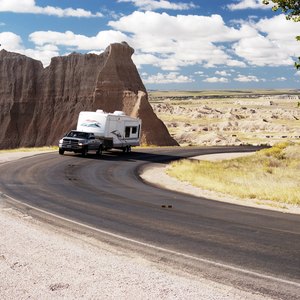
A fifth wheel camper is towed by a truck to which it's connected by a hitch in the truck's bed. With a raised front extension, fifth wheels are typically 21 to 40 feet long and sleep four to eight people. Once the trailer is set up at its destination, the truck is disconnected and available for side trips or errands. Depending on the model, length and options, the price of a new fifth wheel can range from $15,000 to $150,000, but financing is available for both new and used vehicles.
Towing Vehicle
A pickup truck is required for a fifth wheel camper and must match the towing capacity needed to pull the camper. Fifth wheels are typically heavy vehicles and require a heavy-duty truck, especially if the camper has numerous slide-outs that provide additional living space when the camper isn't being towed. Purchasing and financing the towing truck is a separate transaction, but the expense is considered part of the total cost of owning a fifth wheel.
Loan Providers
Financing for a fifth wheel can be obtained through the dealership where the camper is purchased or at banks, credit unions and private firms that specialize in recreation vehicle loans. The base interest rate is usually tied to those offered on auto loans, but the buyer’s personal credit score also is considered.
Application Process
The buyer will need to provide employment, income and existing debt information, as well as the amount of financing requested for the fifth wheel. A down payment of between 10 to 20 percent of the purchase price is typical, and the loan must meet the minimum amount the financing company requires. Generally, the camper must be new or no older than the model year set in the finance company's policy. Some companies will not finance if the owner plans to live in the fifth wheel full time and doesn't own another home.
Deductible Interest
Although a fifth wheel is mobile and not considered real estate, it still may qualify as a second home. The Internal Revenue Service allows mortgage interest to be deducted on both a primary and second home. According to IRS Publication 936, the camper may qualify as a second home if it is not considered rental property; the camper has basic sleeping, cooking and bathroom facilities; and the loan is secured by the camper or a primary home. This type of savings could help offset the expenses of financing the fifth wheel.
References
Writer Bio
A resident of Evergreen, Colo., Debbie Sullivan Reslock has been writing since 2007 and has published articles in the "Denver Post" and "Planning" magazine. She has master's degrees in business administration as well as urban and regional planning from the University of Colorado.

